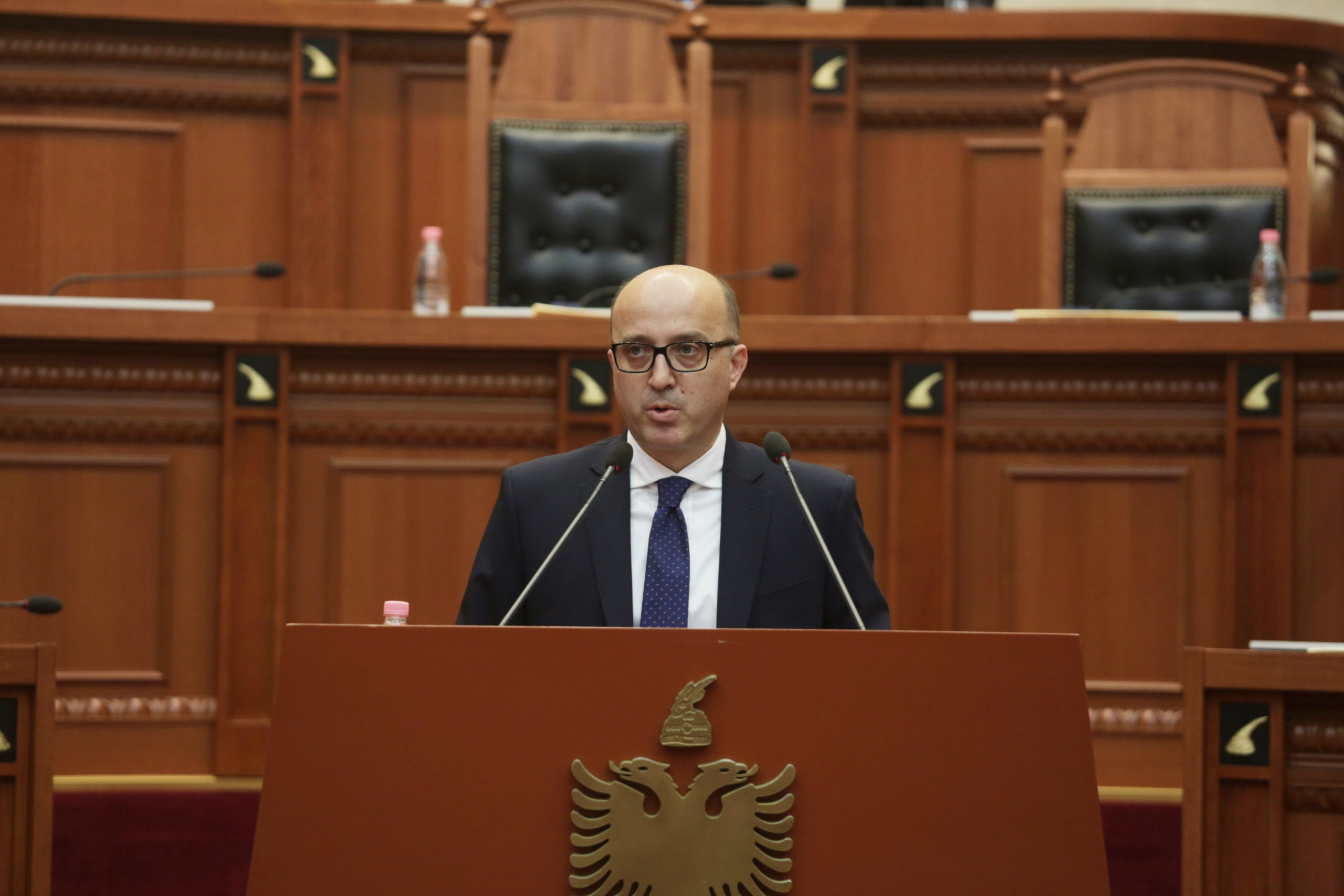Honorable Speaker of the Assembly, Mr. Ruci,
Honorable Members of the Parliament,
Ladies and gentlemen,
It is my pleasure to present to you the first report of the High Inspector of Justice for 2020, which includes the first 11 months of work. I will try to be concise to save you time, provided that the full report is available to everyone.
The inspection of each magistrate’s work in the Republic of Albania, a practice that previously existed divided into separate institutions, has taken on a new dimension, through a Constitutional independent institution such as the High Inspector of Justice, established on February 1st, 2020.
HIJ reviews, verifies, investigates and prosecutes every judge and prosecutor in the Republic of Albania, who is suspected of having committed a disciplinary violation. According to the law, the High Inspector of Justice is set in motion based on the written complaint of any interested natural or legal person, or public body, including the Minister of Justice; Prosecutor General; members of the High Judicial Council or the High Prosecutorial Council; presidents of courts, heads of prosecutor’s offices, as well as on its own initiative.
Since HIJ is a new institution, since in the beginning, I have considered a personal and institutional challenge, building and implementing the best standards and principles, without being influenced by the wills or subjectivisms of the moment, or the heat of the current debate, but by seeing the issues in principle and at the core of maintaining an important balance of them.
It has not been easy at all in the beginning, because being set up from scratch, our institution had the most basic challenges, from equipping offices and temporary staff, regulating legal, structural and physical activity, designing and devising the applications and recruitments methods, completing the staff while lacking workplace, to confronting an influx of inherited files since the very first days. The restrictions which came as a result of the Covid-19 pandemic were another added element of difficulty, it was the same for every institution actually, but to the HIJ particularly, they brought the suspension of the competition and the recruitment process.
During its first year of work, HIJ had only 1 magistrate inspector, inherited from the former HJC and we relied on the assistant inspectors for the internal recruitment process. 13 magistrate inspectors in the Organizational Structure are selected by the HJC and the HPC, and 13 non-magistrate inspectors, a process still unfinished for subjective reasons, mainly related to the lack of interest after calls for candidacy by the High Judicial Council and the High Prosecutorial Council, according to the law.
As a statistics, the number of files submitted to HIJ by institutions, such as the High Judicial Council, the High Prosecutorial Council, the Prosecutor General and the Ministry of Justice, but also the complaints received since the establishment of the Institution until December 2020, exceeds 3054. (2104 transferred and 950 submitted to HIJ from February 1st to December 31st, 2020. 184 decisions have been approved and 1347 practices have been handled)
Being a person who likes to see the glass half full, I will not talk about difficulties, but about the work we have done, despite them.
Since the first days of taking office, I have defined as an important priority the verification of releases on parole of the convicted persons. It was a highly sensitive issue of public interest. I would like to share with you the fact that only with 1 magistrate inspector available has voluminous work been done during the 11 months of work in 2020. Taking into consideration that every request that arrives at the institution goes through several stages, which are “review”, “verification”, “investigation” and “disciplinary proceedings”, all of which have their working deadlines, during 2020 the High Inspector of Justice has approved 8 decisions to initiate a disciplinary investigation (2 prosecutors and 6 judges), 5 of whom (one magistrate-prosecutor and 4 magistrate-judges) are investigations initiated mainly by HIJ and the other 3 (magistrate-judges) are investigations initiated by cases submitted by institutions. (2 MJ, 1 HPC). Thus, from February to December 2020, 4 requests were formulated to commence a disciplinary investigation, 3 at the HJC and 1 at the HPC. During this reporting period, the HJC accepted the request of HIJ for the dismissal of a magistrate judge, while the HPC rejected HIJ’s request for a disciplinary measure against a prosecutor magistrate, a decision which HIJ has appealed.
We consider this balance important for our conditions, as we have paved the way for the future.
On the other hand, the High Inspector of Justice Office pays special attention to the requests coming from the citizens. From February 1st to December 31st there were 756 complaints from citizens. This figure shows considerable interest if we take into account the pandemic situation and the fact that we were a new institution without infrastructure. Citizens’ expectations are high and this imposes maximum seriousness and commitment on us. Being aware of this public approach, we have made it easier for the citizens to submit their complaints. Complaints can be made online through a form found on the HIJ website, along with a guide to filling it out, which is a time-saving process. The complaint can also be made at the HIJ institution, where the special staff assists each citizen in the process of filling out the complaint form and the third way is by mail. So everything for the citizen to have the right access for every violated right claim.
Our work will continue with clear goals and objectives, which will result in setting standards on verifying complaints, handling them as soon as possible and investigating mainly disciplinary violations, a process that is of particular importance, to increase the responsibility of judges and prosecutors in their duty performances, increase public trust in the judicial bodies, increase the quality of judicial service and that of the prosecution, etc. For a clear orientation, HIJ has drafted, with wide consultation, and has already approved the “Strategy and two-year action plan” with strategic objectives related to the independence, efficiency and professionalism of the HIJ Office; the development of the verification process, disciplinary investigation and inspection in accordance with the principles of disciplinary proceedings and international standards; active participation in the processes of coordination and institutional cooperation as well as increasing transparency and public access to the High Inspector of Justice Office.
In the vision of the High Inspector of Justice, inspection should not be seen as to hammer prosecutors and judges. There is no doubt that those who have committed violations should be feared now and forever, yet it is important to find the right balance among the public interest to monitor and see the administration of justice by judges and prosecutors, the separation of powers, and the independence of judges and prosecutors.
I am aware that the fulfillment of the goals we have set for ourselves will require time, and especially wider cooperation with various national and international institutions and mechanisms. From the review, verification, further investigation to disciplinary proceedings, the goal of the High Inspector of Justice Office remains the radical change of the inspection concept to unify the best standards of justice for all. I have been pleased to note, in our working meetings with other important institutions such as the HJC, HPC and PG, that this is a shared idea. It is a vision, which the High Inspector of Justice will share in the thematic inspections, which take place in every court and prosecution office in the country.
To conclude, I would like to thank the Assembly and especially the Law Commission for supporting and encouraging the HIJ. The institution of the High Inspector of Justice is open to the cooperation and contribution of all to finalize the common goal which such a profound major reform was carried out for: equal justice for all.
Five years after the reform was approved, the time has come for the citizens to see results, because strengthening the independence, responsibility and efficiency of the judicial system is crucial to a functional, impartial system, with integrity and whose focus is the citizen. These are the foundations of a strong and democratic rule of law, which we all would like to have.
To watch the full video of the speech of HIJ, Mr.Metani, click on the video below.

